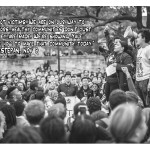One day — shortly after returning to Yale following summer vacation — I said something grammatically incorrect to a friend. Perhaps I used a double negative or switched up the proper syntax of a sentence but the actual content of my utterance was irrelevant. After I finished speaking, my friend looked at me, puzzled, and pointed out my mistake.
Immediately, I kicked myself for my blunder.
Language, among other things, is often a marker of class. We like to think that we’re not judged for certain cultural markers. When I explained why I had to code switch at Yale, my friend made the argument that I shouldn’t feel the pressure to adhere to grammatically correct English. She naively argued that my peers would instead judge me for the content of my ideas. In Ryan Bloom’s 2012 New Yorker article “Inescapably, You’re Judged by Your Language,” he writes that every statement contains biases and secret constructions. And unfortunately, when we use syntax that deviates from “standard” English grammar, it can often be a marker of belonging to a lower class.
At Yale, many students and professors tend to adhere to a white, upper-middle-class culture. A quick Google search of the demographic breakdown of the freshman class will show that at least one-third of freshmen belong to families that make over $250,000. Although it’s hard to discern exactly how classism culturally manifests on campus, the markers are certainly there. When you grab lunch with your peers, how many of them use double negatives? Or casually bring up Sartre in conversation? Or use the proper French pronunciation to order a croissant? Language is power; the Yale vernacular is socially powerful.
But classism quite obviously extends beyond language and culture at Yale.
So many factors — both culturally and materially — contribute to the socio-economic pressures that many students face at Yale. Last week, on Thursday, there were protests against the student income contribution. For many students, the student income contribution — which is set at $5,950 for most students — is an inhibiting factor that disproportionately affects some students. Many Yalies feel the pressure to take out loans and acquire student jobs in order to pay off the student income contribution, although Yale claims that no student should have to take out such loans. It seems obvious that something should be done to minimize the cost of tuition for those who are most in need of financial aid.
There are many expenses unaccounted for by the Financial Aid Office. In my freshman year I spent over $400 for books for Directed Studies. Although I am lucky enough to have a job with relatively short hours and a fairly good financial aid package, the cost of school supplies and everyday expenses were still quite steep. I am not alone in this experience.
But we shouldn’t stop at minimizing the student income contribution.
We must recognize that classism is much more complicated than reducing tuition. For many of us hailing from inner cities and lower to working-class backgrounds, matriculating at Yale is also a culture shock. We have to teach ourselves many small things — from the language we use and the publications we reference — in order to navigate this deeply socially stratified space. The student income contribution is an obvious barrier to fully engaging with campus life; the panacea to the cultural quandary seems less apparent.
We’re all trying to get ahead here; don’t judge others when they don’t pick up on certain cultural markers. If a freshman says that they haven’t read Livy do not gasp in horror. Instead, pick up your handy copy of the “History of Rome” and show them your favorite part. Not everyone has been to Paris, not everyone knows what herringbone print is and not everyone listens to Wagner. We all grew up with unique knowledge in unique contexts. Sharing is caring, and in sharing, we must find ways to help provide support for these students on an institutional and social level.
Change is personal as well as political.
Isis Davis-Marks JE’19 / She can be reached at isis.davis-marks@yale.edu
*The article was originally published in Yale Daily News Opinion Section on October 12, 2016


